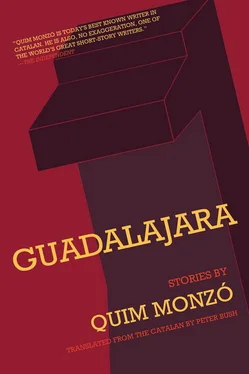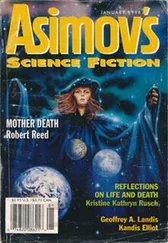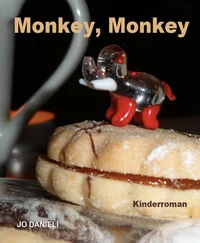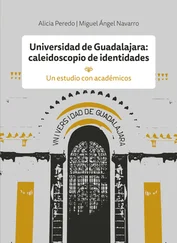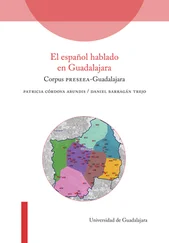Quim Monzó - Guadalajara
Здесь есть возможность читать онлайн «Quim Monzó - Guadalajara» весь текст электронной книги совершенно бесплатно (целиком полную версию без сокращений). В некоторых случаях можно слушать аудио, скачать через торрент в формате fb2 и присутствует краткое содержание. Год выпуска: 2011, Издательство: Open Letter, Жанр: Современная проза, на английском языке. Описание произведения, (предисловие) а так же отзывы посетителей доступны на портале библиотеки ЛибКат.
- Название:Guadalajara
- Автор:
- Издательство:Open Letter
- Жанр:
- Год:2011
- ISBN:нет данных
- Рейтинг книги:3 / 5. Голосов: 1
-
Избранное:Добавить в избранное
- Отзывы:
-
Ваша оценка:
- 60
- 1
- 2
- 3
- 4
- 5
Guadalajara: краткое содержание, описание и аннотация
Предлагаем к чтению аннотацию, описание, краткое содержание или предисловие (зависит от того, что написал сам автор книги «Guadalajara»). Если вы не нашли необходимую информацию о книге — напишите в комментариях, мы постараемся отыскать её.
Guadalajara — читать онлайн бесплатно полную книгу (весь текст) целиком
Ниже представлен текст книги, разбитый по страницам. Система сохранения места последней прочитанной страницы, позволяет с удобством читать онлайн бесплатно книгу «Guadalajara», без необходимости каждый раз заново искать на чём Вы остановились. Поставьте закладку, и сможете в любой момент перейти на страницу, на которой закончили чтение.
Интервал:
Закладка:
What had happened? The room seemed really tiny and the smell much less mildewy than before. There were hooks on the wall to hang a broom and mop on. In one corner, two buckets. Along another wall, a shelf with sacks, boxes, pots, a vacuum cleaner, and, propped against that, the ironing board. How small all those things seemed now—he’d hardly been able to take them in at a glance before. He moved his head. He tried twisting to the right, but his gigantic body weighed too much and he couldn’t. He tried a second time, and a third. In the end he was so exhausted that he was forced to rest.
He opened his eyes again in dismay. What about his family? He twisted his head to the left and saw them, an unimaginable distance away, motionless, observing him, in horror and in fear. He was sorry they felt frightened: if at all possible, he would have apologized for the distress he was causing. Every fresh attempt he made to budge and move towards them was more grotesque. He found it particularly difficult to drag himself along on his back. His instinct told him that if he twisted on to his front he might find it easier to move; although with only four (very stiff) extremities, he didn’t see how he could possibly travel very far. Fortunately, he couldn’t hear any noise and that suggested no humans were about. The room had one window and one door. He heard raindrops splashing on the zinc window sill. He hesitated, unsure whether to head towards the door or the window before finally deciding on the window—from there he could see exactly where he was, although he didn’t know what good that would do him. He tried to twist around with all his might. He had some strength, but it was evident he didn’t know how to channel it, and each movement he made was uncoordinated, aimless, and unrelated to any other. When he’d learned to use his extremities, things would improve considerably, and he would be able to leave with his family in tow. He suddenly realized that he was thinking, and that flash of insight made him wonder if he’d ever thought in his previous incarnation. He was inclined to think he had, but very feebly compared to his present potential.
After numerous attempts he finally managed to hoist his right arm on top of his torso; he thus shifted his weight to the left, making one last effort, twisted his body around, and fell heavily, face down. His family warily beat a retreat; they halted a good long way away, in case he made another sudden movement and squashed them. He felt sorry for them, put his left cheek to the ground, and stayed still. His family moved within millimeters of his eyes. He saw their antennae waving, their jaws set in a rictus of dismay. He was afraid he might lose them. What if they rejected him? As if she’d read his thoughts, his mother caressed his eyelashes with her antennae. Obviously, he thought, she must think I’m the one most like her. He felt very emotional (a tear rolled down his cheek and formed a puddle round the legs of his sister), and, wanting to respond to her caress, he tried to move his right arm, which he lifted but was unable to control; it crashed down, scattering his family, who sought refuge behind a container of liquid softener. His father moved and gingerly stuck his head out. Of course they understood he didn’t want to hurt them, that all those dangerous movements he was making were simply the consequence of his lack of expertise in controlling his monstrous body. He confirmed the latter when they approached him again. How small they seemed! Small and (though he was reluctant to accept this) remote, as if their lives were about to fork down irrevocably different paths. He’d have liked to tell them not to leave him, not to go until he could go with them, but he didn’t know how. He’d have liked to be able to stroke their antennae without destroying them, but as he’d seen, his clumsy movements brought real danger. He began the journey to the window on his front. Using his extremities, he gradually pulled himself across the room (his family remained vigilant) until he reached the window. But the window was very high up, and he didn’t see how he could climb that far. He longed for his previous body, so small, nimble, hard, and full of legs; it would have allowed him to move easily and quickly, and another tear rolled down, now prompted by his sense of powerlessness.
As the minutes passed, he slowly learned how to move his extremities, coordinate them, and apply the requisite strength to each arm. He learned how to move his fingers and gripped the windowsill. Seconds later he finally succeeded in raising his torso. He thought that was a real victory. He was now sitting down, legs crossed, with his left shoulder leaning on the section of wall under the window. His family stared at him from one corner of the room with a mixture of admiration and panic. He finally pulled himself on to his knees, gripped the sill with his hands, so he wouldn’t fall, and looked out of the window. Part of the building on the other side of the street stood out clearly. It was a very long, dark building, with symmetrical windows that broke up the monotony of the façade. It was still raining: big drops of rain that were easy to spot individually and hit the ground separately. He made one last effort and pulled himself up and stood erect. He marveled at being so vertical, yet felt uncomfortable at the same time, even queasy, and had to lean on the wall so as not to fall down: his legs soon went weak, and he gently eased himself down until he was back on his knees. He crawled towards the door. It was ajar. He had to push it to open it wide, and he pushed so energetically (he found it difficult to estimate the effort strictly necessary for each gesture he made) that he slammed it against the wall and it swung back and almost shut. He repeated the movement, less brusquely this time. Once he’d managed to open the door, he went out into the passageway, still on his knees.
Could humans be somewhere in the house? Probably, but (he imagined) if he did find any, they wouldn’t hurt him; he looked like them now. The idea fascinated him. He’d no longer have to run away for fear they’d crush him underfoot! It was the first good thing about his transformation. He saw only one drawback: they would want to speak to him, and he wouldn’t know how to reply. Once he was in the passage, he pulled himself up again with the help of his arms. He didn’t feel so queasy now. He walked along slowly (his legs bore his weight better now) and every step forward he took became easier. There was a door at the end of the passage. He opened it. The bathroom. A toilet, bidet, bathtub, and two washbasins under their respective mirrors. He had never looked at himself before and now saw immediately what he was like: naked, fat, and flabby. From his height in the mirror he deduced he wasn’t yet an adult. Was he a child? An adolescent? He was upset to see himself naked; he didn’t understand why—nudity had never bothered him before. Was it the misshapen body, the pounds of flesh, the chubby, acne-ridden face? Who was he? What was he all about? He walked through the house, gaining in stability all the time. He opened the door to the bedroom that was next to the bathroom. There were some skates next to the bed. And lots of pennants on the walls. There was also a desk, exercise books, reading books. And a shelf full of comics, a football, and some photos. A photo of himself (he recognized himself straightaway, just like in the bathroom: fat, spotty, and dressed as if for indoor football, in a blue jersey with a white stripe on each sleeve). He found clothes in the cupboard: underpants, a T-shirt, a polo, tracksuit bottoms, socks, and sneakers. He got dressed.
He looked through the spy-hole in the front door. Outside he could see a landing and three more front doors. He went back to the living room, ran his finger along the spines of the few books on the shelves. He caressed a china mug. Turned on the radio. Music blared out, but he couldn’t understand the words:
Читать дальшеИнтервал:
Закладка:
Похожие книги на «Guadalajara»
Представляем Вашему вниманию похожие книги на «Guadalajara» списком для выбора. Мы отобрали схожую по названию и смыслу литературу в надежде предоставить читателям больше вариантов отыскать новые, интересные, ещё непрочитанные произведения.
Обсуждение, отзывы о книге «Guadalajara» и просто собственные мнения читателей. Оставьте ваши комментарии, напишите, что Вы думаете о произведении, его смысле или главных героях. Укажите что конкретно понравилось, а что нет, и почему Вы так считаете.
